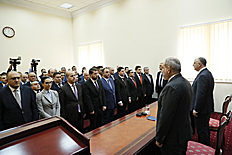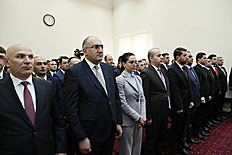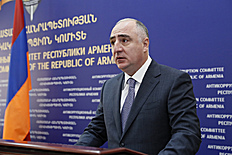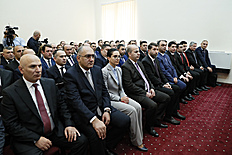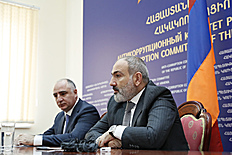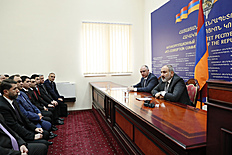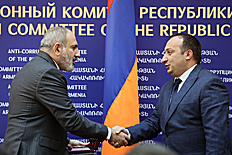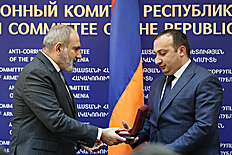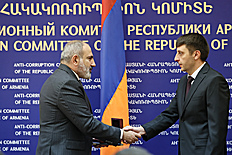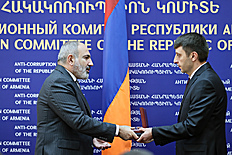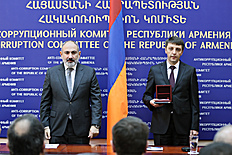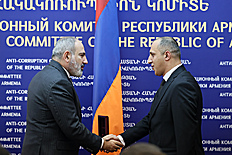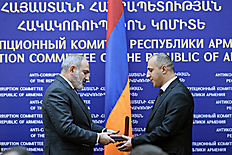Press releases
An anti-corruption system is formed today, which must fully operate, and the damage done to our country by corruption has to be restored. Prime Minister
more 10 photos
Prime Minister Nikol Pashinyan visited the Anti-Corruption Committee today and attended the event dedicated to the Day of the Anti-Corruption Committee employee and the first anniversary of the establishment of the structure.
Director of the National Security Service Armen Abazyan, Police Chief Vahe Ghazaryan, Head of the State Supervision Service Romanos Petrosyan, Chairman of the State Revenue Committee Rustam Badasyan, Chairman of the Supreme Judicial Council Karen Andreasyan, Chairman of the Investigative Committee Argishti Kyaramyan, Prosecutor General Anna Vardapetyan, leading staff of the Anti-Corruption Committee, investigators, other officials attended the event.
The Chairman of the Committee Sasun Khachatryan made a report on the formation of the Anti-Corruption Committee and the work done in one year. He noted that the fact of being the only investigative body carrying out operative-investigative activities in Armenia creates new opportunities for effective investigation and at the same time creates great expectations from the Committee. Presenting the statistical indicators of the already investigated criminal proceedings, Sasun Khachatryan said that the number of cases in the proceedings of investigators has more than tripled in one year. Since October 23, 2021, 1042 criminal proceedings have been investigated in the Anti-Corruption Committee, while 565 criminal cases were investigated in the Special Investigative Service of the Republic of Armenia during the previous year. Currently, 366 criminal proceedings are under investigation, while in 2021, on October 23, at the time of starting the operation, 114 criminal cases were being investigated in the Anti-Corruption Committee. The Chairman of the Committee also referred to international cooperation and noted that among the Eastern Partnership coutries, Armenia occupies the most leading positions in terms of anti-corruption fight.
Prime Minister Pashinyan delivered a speech, in which he particularly said,
“Dear Chairman of the Anti-Corruption Committee,
Dear representatives of the Government,
Dear employees of the Anti-Corruption Committee,
Today we celebrate the first anniversary of the formation of the Anti-Corruption Committee and also the Day of the Anti-Corruption Committee employee. I would like to congratulate all of us and especially the workers of the Anti-Corruption Committee on this day.
I have to emphasize that the anti-corruption fight is one of the most important public obligations of our government, that is, one of the obligations we assumed before the public. If we try to answer the question to what extent this obligation is being fulfilled, perhaps the first thing to do is to refer to international statistics and rankings. And we will see that in all international reports, the Republic of Armenia is mentioned as a country that has made significant progress in the field of anti-corruption policy and in the fight against corruption, and this progress is continuous. In other words, it is recorded that not a single event has occurred, but it is a process that continues. Also, Mr. Khachatryan mentioned in his speech that Armenia is an absolute leader in the fight against corruption among Eastern Partnership countries.
Now let's return from the international platforms to the Republic of Armenia and ask ourselves if we are satisfied with the results and efficiency of the anti-corruption policy conducted in Armenia. It should be noted that, by and large, we cannot say that we are dissatisfied, but on the other hand, we cannot say that we are satisfied either. Not because no work has been done and there are no results, but most of all because, in terms of the anti-corruption fight, the public's expectations, which can be objective or exaggerated, we have not fulfilled an objective part of the public's expectations, and we must accept and admit it.
On the other hand, back in 2018, we adopted in the Government Action Plan the vision of having a corruption-free country, bearing in mind that corruption is an organized phenomenon or contains a certain element of organization, and it continues to be a priority. In two respects, we cannot say that we are fully satisfied with the work we have done, I say again for two reasons, that, nevertheless, our citizens encounter corruption phenomena in their contacts with state and local self-government bodies, of course, these corruption phenomena are exposed, they are not sponsored by the state or government. In the other case, I said that we were not really able to fulfill an objective part of the public expectations and also our expectations.
The question arises as to why we were not able to implement, whether there was a lack of political will or whether there was a decrease in political will. Absolutely not. On the contrary, when I remember the consultations we had several times in the Government in the past, including with the participation of those present, we defined the task about why we are still unable to record success in a sufficient amount, scope and depth, we ultimately came to the conclusion that here it is very important to make institutional quality reforms that will make it possible to record the political will. Because, to give a very rude example, since the words "corruption" and "fish" have been associated with each other and are associated with each other, the will to catch fish is still not the same as catching fish, because for that you also need a hook, not to mention other tools.
It is true that we have gathered on the occasion of the Anti-Corruption Committee formation day, I want to mention just the institutional side of the issue, because yes, the formation of the Anti-Corruption Committee is a very important institutional reform that requires political will. Because, first of all, we formed an Anti-Corruption Committee, the process of its formation is different from our ideas, and in general, the field of its activity is very specific. It deals with anti-corruption cases in particular, and is our first investigative body, which, in addition to investigative activities, also has the capability to carry out operative-investigative activities.
This is very important in terms of the fight against corruption, because, in fact, the Anti-Corruption Committee, in the process of its institutional formation, has a full opportunity to wage a real and not titular fight against corruption. Although, by and large, it should be noted that the Anti-Corruption Committee is not the only one fighting against corruption and corruption phenomena. In fact, all our colleagues sitting in the front row have a very important role in the fight against corruption. It should also be noted that an individual body cannot fight corruption or eradicate it effectively if there is no political will and cooperation for it. But in the process of forming our institutional will to fight against corruption, i.e. the formation of the hook, I consider it very important to mention the following, that in the end, the Corruption Prevention Commission was formed, which is a very important institution and is also on its way to accomplishment.
The anti-corruption branch of the judiciary was formed, with the Anti-Corruption Chamber of Cassation and judges to hear corruption cases. In other words, this branch was also formed in the judicial system. We should highlight the formation of the illegal property confiscation department in the Prosecutor General’s Office, a Deputy Prosecutor General was appointed for that function, and again with procedures somewhat different from the usual ones. I must also emphasize that, in addition to that department, we now see that the Department of State Interests Protection of the Prosecutor General’s Office is also showing certain initiatives that are related to the fight against corruption or overcoming the damage caused by corruption phenomena.
It is also very important to highlight a number of legislative changes that fully demonstrate not only the political will of the government to fight corruption and prevent corruption, but also create very specific tools for this. Corruption in general, I want to remind all of us again, is related to people who have power and leverage. I want to emphasize the changes we made in the declaration systems of high-ranking state officials. We have developed these declaration systems so much - of course, I do not consider that it has already reached perfection - that we have made very significant changes in the behavior of public officials and control mechanisms of income declaration.
I want to emphasize - this fact is often not paid attention to - but, for example, legislation to reduce the circulation of cash is essential in the fight against corruption, because nobody gives or receives bribes cashless. Although the cryptocurrency stuff was already mentioned, but at least it is traceable, it can also be made more visible.
I want to record that we have introduced many significant anti-corruption institutions in the Republic of Armenia. Yes, we were constantly working on it in 2018, 2019, but there is also that one authority or government may have more will to fight corruption, another government may have less will. It is very important that the level of the fight against corruption in the country does not depend on the will of individuals, because there will always be differences, but rather there should be a benchmark below which the anti-corruption fight in the country cannot fall.
I say all this for the following reason. if so far we have had all kinds of objective reasons and justifications why the fight against corruption in Armenia is not deep enough and why there is no proper restoration of the damages caused by corruption in Armenia, today, despite the fact that the Anti-Corruption Committee is not yet fully staffed, i.e. there are still vacancies, it is clear that there are still difficulties in the work, but I want to say that we, in front of the public and ourselves, we are also part of the public and let's not distinguish ourselves from the public in this regard, we have now formed all the institutional foundations. If at that time it was said that there are legislative obstacles, starting with bank secrecy and continuing with other circumstances, confiscation of illegal property, etc., now all these mechanisms are created, and I want to say on the occasion of the Anti-Corruption Committee Day, but not only about the Anti-Corruption Committee, that we now need to show very specific results.
It is very good that specific cases related to confiscation of illegal property are already submitted to court. I hope that our legislation is sufficiently reformed so that precedents are set and processes go on in a proper manner. I want to say again, to emphasize and I am glad that it has also been proven in practice. we have repeatedly said that there is no distinction between the previous government and current government for us regarding corruption, and not only corruption, but also in all other cases. Equality of all before the law must be realized unconditionally. And, of course, the role of the Anti-Corruption Committee is very important in that respect. Also, of course, the Prosecutor General’s Office has a very key role in the general judicial system, the judicial system has a key role. I want to say that we have implemented that preparatory institutional work.
I should happily emphasize that our will to fight against corruption was so strong that even in the very difficult post-war period, even in the pre-election period, in the post-election period, in the period of some political tensions, we did not stop this reform process for a single minute. Just for recording that, and the occasion was created on the occasion of the Anti-Corruption Committee Day, all the institutional preconditions are in place so that the public gets answers, we all get answers, and we all see results.
In general, I say that to find the root of all the problems in our country, we can look at the problems we have in the education system, it stems from that, and I confirm that. But in order to understand what really happened to us, why many events happened and what cause-and-effect relationships they have, we need to go deep and understand the real scope and real consequences of corruption in Armenia. But this should not be just a political statement. It should be expressed by restoring the damage done to the public and the state.
Every year in the past it used to be the day of the Special Investigative Service, I remember in this hall we recorded that an unprecedented amount of 4.2 billion drams had been restored to the state budget, but at that time it seemed to be a big number and it was big, because if I'm not mistaken, it turned out that there were 3, 4, 5 or even 10 times more recoveries in one year than since the creation of the Special Investigation Service. Yes, this is interesting as a statistic, but I want to say that now the order of numbers should be changed, because we know that those numbers are in some places, are hidden, those properties, those numbers, those people. The figures in turn must be expressed annually.
I am very glad that we have agreed on this topic with the Prosecutor General, because the overall control is carried out by the investigative bodies and the function of the Investigative Committee, the Anti-Corruption Committee, the National Security Service, the Police, the State Control Service, the State Revenue Committee is clear. Every year we have to show the public that as a result of the anti-corruption policy - it doesn't matter through which body - this much of property, this much of money has been restored to the state budget, and those people have been held accountable, no matter from present or former government, active or inactive.
This should be the most important record of our today’s meeting, because, again, it has happened many times before, those present will remember that I invited a consultation, said, and even expressed an opinion, and that opinion was not at all unfounded, that I saw and felt that there are specific state circles, including the law enforcement system, where there are certain phenomena and manifestations of invisible, unprovable resistance. But there were also objective reasons that there was a problem with the limited toolkit. Today, we've overcome that problem, and now it's time to fundamentally change the topic and style of our conversation, results, and visibility.
I would also like to say that what I am talking about is not a matter of political expediency or taste, but corruption is a phenomenon the damage of which to the country's past and future has a very specific content. That content is largely clarified, but also has very specific numerical indicators which also should be clarified, that is, we should have that number concretely, have it every year and also have it in total, and that number should appear in the revenues of the state budget of the Republic of Armenia. And those kindergartens that were not built due to corruption must be built with the money recovered as a result of the anti-corruption policy, schools, the soldier's salary, which has remained unclear, everything else: roads, infrastructure, security and so on should be restored.
And, by the way, in terms of the anti-corruption fight, I attach great importance to the system of social guarantees for people engaged in this work. We also discuss and talk about it all the time, and I say again, it's very important and I'm glad that, finally, the public understood this message. Because every time a question arises that the salaries of investigators, judges, prosecutors, policemen should be increased, the first reaction is that there are so many social problems in this country, but you are raising the salaries of the "elite", so to speak, and creating social guarantees for them.
But in reality, we do it not for those people who receive salaries, but for the people, the public, because those people must protect the interests of the public. Here, too, there is a very important goal of preventing corruption, so that the investigator, leaving his office and walking in the street, should not lose the moral right to look straight in the eyes of the people. But we also have to ensure his welfare, so that these phenomena are not more powerful than the mission that the public, the state, the legislation puts before him.
Once again, I congratulate all of us, and taking the opportunity that there is such a representative audience at today's event, although not all the beneficiaries are present, they will also listen or I will have the opportunity to talk with them on this topic, I wish us success.
I must record that yes, I am glad that our political will has not decreased by a single millimeter. This is very important, because coming to power with a revolution, it is very easy to say we will fight corruption and so on. The hour of truth is now. Having been in power for more than 4 years, potentially dealing with those opportunities, etc., to what extent our political will has remained the same? I want to clearly say that our political will has even increased, because at that time we were perhaps not able, being in the opposition, to evaluate what deep and tragic consequences corruption had and is having on our reality. Now we know it in more detail, we deal with this problem every day, we feel it on our skin every day as responsible people who have to solve problems related to the fate of the country.
Every time we go to solve a problem, we find that there is no tool to solve that problem, or there is a sketch for that tool, but there is no catalyst inside, so to speak, as we encountered cases during the war, when it turned out that, for example, chips that contained gold had been removed from missiles with horryfying names. And this says all. In many cases today, we feel this, the people present here feel it, when they go to solve a problem of critical importance for the state, they take that tool and go to use it, it turns out that the sketch of that tool is there, all the content inside has been removed, and it is not known who removed it. But that's not the point. The fact is that it is not possible to solve the problem with this tool.
Congratulations again and good luck! But I want to say the following again: we have no more room for objective or subjective reasons. I specifically, as the head of the government, as an official who received the people's mandate, record that we no longer have to say wow, you know this point of the law, banking secrecy, the judicial system, etc. An anti-corruption system has been formed, this mechanism must operate fully, and the damage done to our country by corruption must be restored. I reiterate, this is not a matter of political expediency. This is one of the most important tools for ensuring the sovereignty, independence, and security of our state. Thank you”.
A number of Anti-Corruption Committee employees were awarded the Prime Minister's Commemorative Medal for their contribution to the strengthening of law and order.
Prime Minister Pashinyan handed over the awards to the employees of the Anti-Corruption Committee, once again congratulated them and wished them efficient service.
